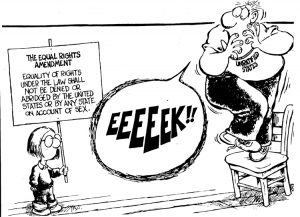The death of famed conservative activist and constitutional lawyer Phyllis Schlafly brought to mind an IWU connection from the 1970s. The University Archives contains a recording of a faculty member rebutting a position Schlafly took on the Equal Rights Amendment (ERA).

Dr. Emily Dunn Dale, 1988 Wesleyana p. 134
Apparently WESN aired an anti-ERA piece by Schlafly and then Anthropology & Sociology Professor Emily Dunn Dale provided a rebuttal to Schlafly’s points. The Schlafly recording is not part of the archives’ collections, but the Argus published an opinion piece by Schlafly that seems fairly close to the points Dale takes up in hers.
A 19 minute recording on reel-to-reel tape contains Dale’s remarks. We had it digitized several years ago out of concern for its condition and you can listen to the whole thing in a collection of historical materials online. Here’s an excerpt from the larger recording, with the text for just this segment below.
“What I have found out, in the process of being a professional breadwinner for my family, is that I had a lot more to gain in terms of self-respect, than I lost in security. As a matter of fact, I found out what most men have to discover: that performing and providing for those who are dependent on you, is a deep source of ego-fulfillment and self-satisfaction. One of the major reasons why I am in favor of the equal rights amendment is that I feel men have paid a terrible price for overprotecting females like Phyllis Schlafly.”
So what was this all about? The Argus contains a two-part series on the pros and cons of the proposed Equal Rights Amendment to the Constitution on January 12, 1973 Argus and January 19, 1973.
A March 22, 1974 Argus article covered a campus forum on the amendment. Dale and IWU alumna, later professor of English, Pamela Muirhead relate their personal experiences of gender inequality in commercial settings.
The cartoon below and a short opinion piece appeared in the February 12, 1982 Argus when the issue surfaced again.

February 12, 1982 Argus p. 3
Congress actually passed the ERA in 1972 and then the states had to ratify it…22 states did so almost immediately but 38 were needed. After a lengthy struggle, detailed on a website devoted to this topic, the proposals failed to be ratified by the extended deadline of 1982. Successive efforts have not advanced as far since then.
